#High Culture vs. Low Culture
Explore tagged Tumblr posts
Text
The Philosophy of Pop
The philosophy of pop refers to the exploration of pop culture, particularly pop music and art, as a reflection of societal values, identity, and meaning. It encompasses ideas about the influence of popular media on individuals and societies, the commodification of art, and how popular culture engages with deeper philosophical themes such as authenticity, consumerism, and aesthetics.
Key Concepts in the Philosophy of Pop:
Pop as a Reflection of Society:
Cultural zeitgeist: Pop music and art often reflect the dominant social, political, and cultural themes of the time, acting as a mirror to societal values and collective emotions. For example, protest songs in the 1960s or the rise of individualism in the 1980s pop music reflect broader cultural movements.
Identity formation: Pop culture plays a significant role in shaping individual and group identities, especially in youth. People often define themselves through their taste in music, fashion, or pop media.
Pop and the Question of Authenticity:
Commodification of art: Pop art and music are often critiqued for being commodified, designed for mass consumption rather than as an authentic form of expression. This leads to philosophical debates about the authenticity of pop culture and whether it can still hold artistic or cultural value when created for profit.
Mass appeal vs. originality: Pop culture���s aim to reach a broad audience can sometimes sacrifice originality for mass appeal. This raises questions about whether pop culture can still be a genuine form of art if it is primarily driven by commercial success rather than artistic integrity.
Pop and Consumerism:
Influence on consumer behavior: Pop culture is deeply intertwined with consumerism, where brands, products, and lifestyles are promoted through music, fashion, and celebrity culture. The philosophy of pop questions how this consumption-driven culture shapes desires, aspirations, and personal fulfillment.
Pop as a commodity: Popular music and art are often created as products to be consumed, marketed, and sold on a large scale. This creates a tension between artistic expression and economic motivation, raising concerns about whether pop can retain its artistic significance.
Pop Culture and Meaning:
High vs. low culture: Pop culture challenges the traditional distinction between "high" and "low" culture, asking whether mass-produced entertainment can have the same philosophical depth or artistic value as classical music or fine art. Philosophers such as Theodor Adorno have critiqued pop culture for being overly simplistic, while others argue that pop music and art can carry deep, meaningful messages.
Escapism vs. engagement: Pop culture is often seen as providing escapism, allowing people to momentarily disconnect from the difficulties of life. However, pop culture also engages with real-world issues, such as race, gender, politics, and social justice, using catchy melodies or relatable characters to draw attention to these matters.
Pop and Aesthetics:
Beauty in simplicity: While pop music is often simpler in structure compared to classical or experimental music, it raises questions about aesthetic value—can something simple and catchy be as beautiful or valuable as something more complex?
Ephemerality of pop: Pop culture is often fleeting, with trends changing rapidly. This raises questions about the lasting value of pop art or music compared to traditional art forms that are designed to endure over time.
Pop as Empowerment and Expression:
Cultural inclusivity: Pop music has historically been a medium for marginalized groups to express their voices, from early rock 'n' roll’s connection to African American culture to the influence of LGBTQ+ culture on genres like disco and pop.
Pop and social movements: Pop culture is frequently tied to social change, using mass appeal to bring attention to issues like civil rights, feminism, and LGBTQ+ rights. Songs, fashion, and art can mobilize people and provide a common platform for expressing dissent or solidarity.
The philosophy of pop explores how pop culture, particularly music and art, engages with deep questions about societal values, identity, authenticity, and consumerism. While often dismissed as superficial, pop culture has the potential to convey profound truths about society, challenge traditional aesthetic boundaries, and serve as a vehicle for social and political change. At its core, the philosophy of pop interrogates how mass culture shapes, reflects, and influences the human experience.
#philosophy#epistemology#knowledge#learning#education#chatgpt#Pop Culture and Society#Authenticity and Commodification#Pop Music and Art#Consumerism and Identity#Escapism vs. Social Engagement#High Culture vs. Low Culture#Popular Aesthetics and Philosophy#pop#pop culture#consumerism
5 notes
·
View notes
Text
Every now and then I think about how subtitles (or dubs), and thus translation choices, shape our perception of the media we consume. It's so interesting. I'd wager anyone who speaks two (or more) languages knows the feeling of "yeah, that's what it literally translates to, but that's not what it means" or has answered a question like "how do you say _____ in (language)?" with "you don't, it's just … not a thing, we don't say that."
I've had my fair share of "[SHIP] are [married/soulmates/fated/FANCY TERM], it's text!" "[CHARACTER A] calls [CHARACTER B] [ENDEARMENT/NICKNAME], it's text!" and every time. Every time I'm just like. Do they though. Is it though. And a lot of the time, this means seeking out alternative translations, or translation meta from fluent or native speakers, or sometimes from language learners of the language the piece of media is originally in.
Why does it matter? Maybe it doesn't. To lots of people, it doesn't. People have different interests and priorities in fiction and the way they interact with it. It's great. It matters to me because back in the early 2000s, I had dial-up internet. Video or audio media that wasn't available through my local library very much wasn't available, but fanfiction was. So I started to read English language Gundam Wing fanfic before I ever had a chance to watch the show. When I did get around to watching Gundam Wing, it was the original Japanese dub. Some of the characters were almost unrecognisable to me, and first I doubted my Japanese language ability, then, after checking some bits with friends, I wondered why even my favourite writers, writers I knew to be consistent in other things, had made these characters seem so different … until I had the chance to watch the US-English dub a few years later. Going by that adaptation, the characterisation from all those stories suddenly made a lot more sense. And the thing is, that interpretation is also valid! They just took it a direction that was a larger leap for me to make.
Loose adaptations and very free translations have become less frequent since, or maybe my taste just hasn't led me their way, but the issue at the core is still a thing: Supernatural fandom got different nuances of endings for their show depending on the language they watched it in. CQL and MDZS fandom and the never-ending discussions about 知己 vs soulmate vs Other Options. A subset of VLD fans looking at a specific clip in all the different languages to see what was being said/implied in which dub, and how different translators interpreted the same English original line. The list is pretty much endless.
And that's … idk if it's fine, but it's what happens! A lot of the time, concepts -- expressed in language -- don't translate 1:1. The larger the cultural gap, the larger the gaps between the way concepts are expressed or understood also tend to be. Other times, there is a literal translation that works but isn't very idiomatic because there's a register mismatch or worse. And that's even before cultural assumptions come in. It's normal to have those. It's also important to remember that things like "thanks I hate it" as a sentiment of praise/affection, while the words translate literally quite easily, emphatically isn't easy to translate in the sense anglophone internet users the phrase.
Every translation is, at some level, a transformative work. Sometimes expressions or concepts or even single words simply don't have an exact equivalent in the target language and need to be interpreted at the translator's discretion, especially when going from a high-context/listener-responsible source language to a low-context/speaker-responsible target language (where high-context/listener responsible roughly means a large amount of contextual information can be omitted by the speaker because it's the listener's responsibility to infer it and ask for clarification if needed, and low-context/speaker-responsible roughly means a lot of information needs to be codified in speech, i.e. the speaker is responsible for providing sufficiently explicit context and will be blamed if it's lacking).
Is this a mouse or a rat? Guess based on context clues! High-context languages can and frequently do omit entire parts of speech that lower-context/speaker-responsible languages like English regard as essential, such as the grammatical subject of a sentence: the equivalent of "Go?" - "Go." does largely the same amount of heavy lifting as "is he/she/it/are you/they/we going?" - "yes, I am/he/she/it is/we/you/they are" in several listener-responsible languages, but tends to seem clumsy or incomplete in more speaker-responsible ones. This does NOT mean the listener-responsible language is clumsy. It's arguably more efficient! And reversely, saying "Are you going?" - "I am (going)" might seem unnecessarily convoluted and clumsy in a listener-responsible language. All depending on context.
This gets tricky both when the ambiguity of the missing subject of the sentence is clearly important (is speaker A asking "are you going" or "is she going"? wait until next chapter and find out!) AND when it's important that the translator assign an explicit subject in order for the sentence to make sense in the target language. For our example, depending on context, something like "are we all going?" - "yes" or "they going, too?" might work. Context!
As a consequence of this, sometimes, translation adds things – we gain things in translation, so to speak. Sometimes, it's because the target language needs the extra information (like the subject in the examples above), sometimes it's because the target language actually differentiates between mouse and rat even though the source language doesn't. However, because in most cases translators don't have access to the original authors, or even the original authors' agencies to ask for clarification (and in most cases wouldn't get paid for the time to put in this extra work even if they did), this kind of addition is almost always an interpretation. Sometimes made with a lot of certainty, sometimes it's more of a "fuck it, I've got to put something and hope it doesn't get proven wrong next episode/chapter/ten seasons down" (especially fun when you're working on a series that's in progress).
For the vast majority of cases, several translations are valid. Some may be more far-fetched than others, and there'll always be subjectivity to whether something was translated effectively, what "effectively" even means …
ANYWAY. I think my point is … how interesting, how cool is it that engaging with media in multiple languages will always yield multiple, often equally valid but just sliiiiightly different versions of that piece of media? And that I'd love more conversations about how, the second we (as folks who don't speak the material's original language) start picking the subtitle or dub wording apart for meta, we're basically working from a secondary source, and if we're doing due diligence, to which extent do we need to check there's nothing substantial being (literally) lost -- or added! -- in translation?
#translation#linguistics (sorta)#I love language so much#long post#subtitling#dubbing#transformative work#if you read all the way to the end - THANK YOU I am so impressed#localisation#this is not an academic essay but I still feel bad for not citing sources#low vs high context cultures and languages are concepts from intercultural communication studies#but idk how up to date that is or whether folks even still actually use them#I know they oversimplify things#but it helped me say what I was trying to here so shrug#languages#language soup#meta#language meta#fandom meta of sorts#thanks for the help sorting this out kayla <3#my nonsense
1K notes
·
View notes
Text
I don’t think there’s anything wrong with enjoying particular types of art more than others, but the knee jerk disdain people have towards modern art is disappointing…
I think u have to be ok with not connecting to everything that u see. That’s just fine. Art is like food and there’s going to be some stuff that just doesn’t work for u regardless of if it’s objectively well done or not. There’s a flavour of anti-intellectualism and inferiority complex that seems to accompany ppls hatred of modern art, this discomfort that they “don’t get it” when that’s like. Actually fine. Some stuff u will appreciate once u learn context and others, regardless… u just won’t! I still hate beans & legumes
That being said I also have friends who would rather order the same mac & cheese at a restaurant every single time than risk getting something they won’t enjoy — or won’t enjoy as much. But art costs u very little to try in comparison, so why not try it?
#the other part is stuff like rothkos just works way better in person than on a screen. True of all art but especially true of these big#pieces with such delicately crafted sensory experiences. Also if art makes u uncomf or disdainful that’s also an elicited reaction.#Why do u feel that way? What cultural reasons might cause u to think of it that way? anyways everybody should read blue period.#I personally don’t think there’s rlly anything different between “low art” or “high art”. Ppl get insecure abt what they rlly like or#something and it bleeds into this ‘us’ vs ‘them’ mentality… it’s true we should ask who’s art is curated and preserved and for what reasons#but like. Humanity is humanity. It’s up to you if you want to listen. I just think it’s a shame to turn away before u give it a chance#That being said I’m still a basic Impressionism bitch. Show me a pretty oil painting landscape and I go nuts.#bytebun rambles#I am just talking. Whatever#U can know art history and read badly translated yaoi webnovels. Multiplicity.#to delete
8 notes
·
View notes
Text
I mean like. Not to bring the mood down but... you guys know that's because American media is everywhere right? Like the world is unable to avoid some version of American accent on a regular basis. Of course ppl find it easy to mimic. This is absolutely not restricted to ppl in the UK, its really common for ppl who learn English as a foreign language to have perfect 'American actor' accents (cause the reason everyone's so good at the American accent that's expected of them as actors is cause at large there's little distinction between regions in the 'Hollywood accent' that ends up on TV and films and stuff. You guys have massive regional differences in pronounceation, but what makes it on to TV (in 9/10 cases) is a very standardised version of American English.)
But yeah. It's not just actors lol. Most British ppl can speak in a passable american accent, as can loads and loads of people worldwide. I'm not saying this to be like 'you should feel guilty! 😡' but it does always stun me when Americans are unaware of the impact their country has worldwide on all versions of English (and even on use of native languages. Many countries are using English more and more over their native languages and dialects , and yeah, historical colonialism has had an impact there.)
But in the last few decades things have progressed way way faster and that, is thanks to the impact of anglo/american/ect lead capitalism. I'm in no way dismissing the impact the UK has on this, but in recent years, its the US that is largely pushing that train .While the UK and several English speaking commonwealth countries are very involved in this kind of capitalist imperialism, there's a reason that more and more people are speaking American English. Not one of the many UK dialects, not Australian English, or NZ English. Across the world more and more people are increasingly speaking in the same standardised american dialect that's in so much of the media you export. Hollywood based media, with that standardised accent/ dialect and the standardised 'normal american life', has a stranglehold on the world and I just find it crazy that a lot of you guys don't even know.
It's stupid stuff like. So many countries are importing american cars and are widening their roads/ changing town planning to account for it (this is less of a thing in the UK but I see it more and more when I travel). Its the food becoming avaliable everywhere. Its the influence that for profit healthcare has even on countries with socialised health systems. Its houses being built to account for American style appliances. Fashion trends. Worldwide, everything is slowly evolving to be closer and closer to this 'American standard' which honestly? I really don't think actually represents the lives of real American people either. You've been turned in to products, the system has taken an unrealistic snapshot of 'American life' and it's being sold to you all day in day out, but it's also being sold to the rest of us. It's being pushed on us all.
Kids in the UK go through phases of talking only in American accents. Anyone born later than the 90s is carrying round 2 sets of spelling and vocab, cause we're all so used to the American way, that you barely know which one you're using half of the time. In the UK we have always had really strong regional accents yeah, and dialects differ between areas that seem tiny to you guys, I know. But like. Those dialects are being lost cause all UK accents are evolving to become closer to this standardised american and yeah not great, but at least we share a language! US American society is largely rooted in the same foundations as UK society, largely we have the same flaws! But oh my god. What about the rest of the world.
It's global. This impact continues to be seen, steamrollering ahead, in places that had completely different starting points. UK culture isn't that dissimilar to that of the US, so we aren't losing nearly as much as cultures that had something completely different. So much is being lost.
Languages and dialects and everything else is just being wallpapered over so we all meet the same ideal of the 'American life' and it's not even real! It's just a product based on how ppl were actually living in the US, manipulated until it's the most marketable mould. You guys are victims of it as well but like. It's based on your culture so you don't lose as much if you conform to it. Just like how in the UK, if we conform, we lose more than US, but nowhere near as much as countries that had languages, dialects and cultures that were so so different to UK/US culture. The less like the US, your starting point, the more there is to lose.
And look. I said it to start with. I'm not having a go. That's not what this is. But you guys really need to be aware, you need to make an effort to understand the impact that this plastic Hollywood american culture is having on the rest of the world. You need to actively look for it, and make an effort to not pay in to it. Because when Americans see other cultures represented in media and say its not relatable, when you guys go on holiday and make no effort to learn local customs, and try and pay in dollars and spend your time abroad like you're still in America, when you see cultural differences and immediately argue that the American way is better and of course everyone should have giant cars and never dry laundry outdoors and live in American style homes, without any kind of critical thought. Just 'this is how we do it so why wouldn't everyone else do it this way. This is the only way. The American way is obviously best.' When you guys do that you are individually feeding in to this absolute bulldozing of cultures (including American ones!) to allow for better marketability.
It isn't any one individual American citizens fault that things are the way they are, and you guys are victims of the same system, but you need to have some self awareness when it comes to the fact that as individuals you are unknowingly, helping driving this forwards and as individuals, there are things you can do to limit your personal impact (and no arguing that you have no culture is not it!!! Being all self deprecating doesn't do shit. Take some responsibility and accept that individual Americans didn't create this system, but currently, individual Americans really are doing their bit to keep promoting it, to keep pushing it on the rest of the world.
And I've already rambled for an age so I'll stop here but I just want to make clear as an ending note here, that this really isn't about piling on Americans and being all 'boo it's all America's fault. They should apologise. Their culture isn't worth anything.' Not at all this is the opposite of that. The fact that millions of Americans have been convinced you have no culture, all while a mimicry of American culture is plastered on to the rest of the world, and while you as individuals are encouraged to help that happen, often without even realising what you're doing; is a crime. You've been wronged, as have we all.
And America is not the problem. The problem is imperialism and it didn't start with you guys. It started in Europe, and Europeans, particularly British ppl, have a responsibility to push back and be self aware, take some fucking responsibility and not inadvertently keep feeding in to that system, just as you guys do. The US didn't start the fire, imperialist capitalism is a fire that started burning long before the United States was even considered, but its on all of us, to do what we can to not feed that fire. And right now? You guys are the face of it.
This idea of what America is, is the face of imperialistic capitalism, and that means that even if you don't mean to, you guys are feeding that fire more so than the rest of us. You're responsible for spreading it, more so than the rest of us. And if you don't step up and take responsibility, accept that you're gonna get it wrong sometimes and you need to try to do better; if we don't all do that. There will be nothing left. They'll paper over it all, the lives of real Americans just as much as those in Scotland and India and the Netherlands, and 100 other cultures, that are at risk, thanks to this fire, that's currently, largely coming from America.
So yeah. It's absolutely not just on you guys and ppl who act like there's no racism or wealth divide in Europe or anywhere else for that matter are complete idiots, however, this Americanisation of the world (and I hesitate to call it that. Because its not a representation of real American lives. Its simply wearing an American face.) Its real. It's happening.
And we don't tell you about it to make you feel guilty (those of us who aren't dicks at least) ,we are telling you. We are kicking up a fuss. Because it isn't fair. It's not right and while individual Americans ignore that and refuse to take responsibility where they can (small apples. We aren't asking for you to call a violent revolution in our names. Just take some time to learn about the rest of the world. Stop assuming America is always right and examine your biases. When you find them. Stop personally pushing them.) , while that is happening, as individuals, you are contributing to this. It's not even altruism. This system is hurting Americans too. It's hurting us all. All we ask is that you do what you can to not personally contribute, and keep an open mind, be aware. That's all any of us can do.
when a british actor does an american accent everyone’s like “i didn’t even know they were british until they were on colbert.” but when americans do a british accent everyone’s like “they’re supposed to be from east cocksford but their glottal e’s are north dicksford. shameful.”
#so yeah sorry to rant but honestly#I'm so tired of ppl refusing to take responsibility on every side of this#imperalistic cruel capitalist regimes going 'well hey. at least we aren't America. this is their fault.'#meanwhile. Americans contribute to the bulldozing of their own cultures to make room for a capitalist monster wearing them as a mask#and if you call out any Americans or make them aware of something they are doing individually that isn't helping. it's either#refusing to see/ accept their own bias. or just as bad! yes! just as bad!!! america is beyond help. there's nothing worth saving#nothing we can do. that's bullshit and making stupid excuses like 'oh our schools don't teach us to respect other cultures'#'we don't know how.' fucking learn! try! that's all anyone asks of you. nobody cares about your schooling. school is shit for working class#ppl in most countries!#you think the english curriculum is any more balanced? we're subjects of a colonial empire. it's propaganda and its not even competent!#i don't think the average American understands how many more hours of schooling they get vs a lot of places. I'm not saying it's right#but teaching time? you guys have longer school days and you stay in school till youre older. our national curriculum ends the year we turn#16 in the UK. year 11 finishes in June. you can leave school 2 months shy of 16 to get a supermarket job. (and many working class ppl do)#and our government still pat themselves on the back and say its eqv. to high school finishing at 18 in other countries. like for context.#i haven't had a geography lesson since i was 13. my last english lesson? i was 15. that's completely normal here. so yeah. the#'our schooling was shit so we can't use Google to learn a bit of geography' falls pretty fucking flat. sorry.#they should have done better by you but they didn't. join the queue. do what you can and take some fucking responsibility now#the only way out of this is for us all. American and otherwise. to do what we can. be self aware. try to be better. keep learning#because if you fall to apathy? capitalism wins. if you believe the propaganda? capitalism wins. if capitalism wins we all lose#the system is designed to wear you down so you're too tired to remember that it doesn't have to be this way.#that's been happening for decades and it's why things are such a mess now. the only way out. is remember there is a way out#climb towards it. do what you can. it seems like low hanging fruit. it doesn't look like enough to change anything.#but there are more ppl being hurt by this system than those benefiting. 99% of us. if everyone picks an apple. that's a lot!#that's a fucking lot! keep going even when it seems like you aren't making progress. make your voice heard. vote. don't passively support a#system that's on its way to destroying you. destroying us all. do what you've got to do to live. but don't forget that all the things that#seem like they don't matter? really really do matter once you add up everyone's contributions. you can't control other ppls actions only#your own. but your contribution matters. your vote matters. your voice matters. join the union. educate yourself. stay curious. question.#the informations out there go online learning 1 thing. challenging 1 bias is better than all or nothing. i dont have time to learn anything#small apples. low hanging fruit. the oceans made up of billions of drops. the longer you don't try. the longer you've no chance of success#we can do better. we can absolutely all do better.
36K notes
·
View notes
Text
really disheartening to see how much eco-fascist and eugenicist bullshit has embedded itself into writings about human relationship with nature. I was looking at a copy of a book in the library a while back called Humans Vs. Nature and found this (Discussing early human migrations in the Paleolithic)
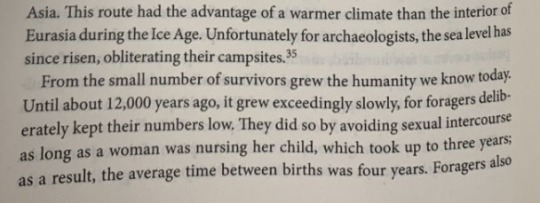
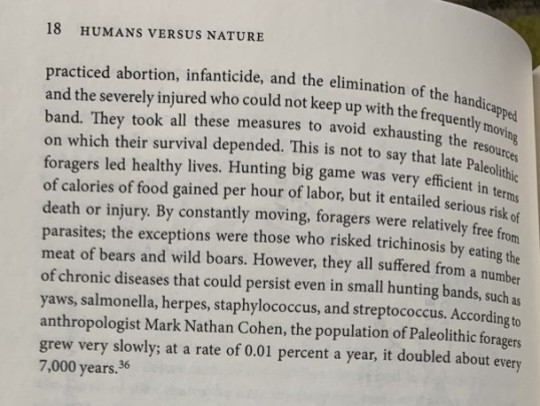
To my great dismay, I did not record the source for this claim, But I found these pictures again, and of course I think...How do we know that?
How could we know that Paleolithic hunter-gatherers deliberately controlled their populations by periods of abstaining from sex? That would be incredibly hard to support using archaeological evidence. It seems easier to support infanticide using the archaeological record, so I was not initially troubled by that.
The author is also stating that Paleolithic humans killed their disabled. I have been searching high and low for evidence to support this claim and the closest I've come to any evidence regarding disability in the Paleolithic is this book chapter discussing whether or not it makes sense to assume compassion existed in pre-history. This book chapter gives the impression that the research has been...really dismal.
The two sides of the debate are essentially, "humans probably cared for their disabled in prehistory, because pathologies and injuries are common and they would have needed some kind of care" and "well maybe those people could survive just fine on their own and that's why they lived. We can't prove they were actually disabled."
Not an anthropologist, but I think it's pretty stupid to position a compassionless society as the "null hypothesis," especially based upon chimpanzees. Why would Paleolithic humans be more behaviorally similar to a relative separated by 5 to 13 million years of evolutionary divergence, than to their own descendants a mere few thousand years later????????
But the claim in Humans Vs. Nature isn't just that disabled people weren't cared for, it's that they were deliberately "eliminated," which is a statement with a much higher burden of proof. You would have to find the remains of disabled humans from that time period with clear evidence that they were killed because they were disabled, and you would have to observe this consistently in many sites, to come to the conclusion that it was a cultural norm.
We have many examples of elaborate, seemingly honorable burials for people that were apparently disabled and would have lived a long time with their disabilities. Nothing I've read has mentioned an archaeological record of killing people for being disabled, which would be a glaring oversight, unless it didn't exist, which I'm pretty sure it doesn't.
How did we get to the point where this kind of fucking bullshit sounds so plausible and correct that it makes it into a best selling book without anyone looking it up to see if it's true.
1K notes
·
View notes
Text
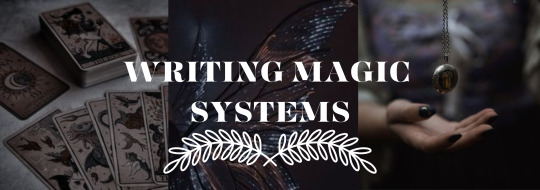
Let's Talk About Magic Systems.
There are two broad ways you can establish magic in your story world - work with existing concepts, or adapting it for something new.
Pick a System
High Magic vs. Low Magic
This distinction existes mostly in the western wrld from the Middle Ages onwards. In non-western cultures, this distinct often doesn't exist.
High magic requires magicians to study from books, ingredients are expensive and instruments elaborate and hard to get. The typical practioner of High Magic is of the upper class, highly educated, and rich. They serve in King's courts and have high social standing thanks to their knowledge.
Among the lower classes and women, Low Magic is ore common. It is taught orally and doesn't require reading skills and uses everyday objects and ingredients.
Black vs. White Magic
"White" magic is often associated with good, and "Black" with the evil. However, what really matters is the magicians intension, not the magic system that they work with.
The term "black magic" is often associated with working with the dead. It can also be used by an individual/group who just wants to appear more menacing.
Ceremonial Magic
This kind of magic involves lots of ritual, recitation and prayer, often in ancient langauges such as Latin, Aramaic and Sanskrit.
Most of the time, it's High Magic and practiced by religious figures.
The typical practioner is educated, has great confidence and a good memory.
Natural Magic
It involves ingredients from nature, such as herbs and water.
It may be practiced outdoor, in a kitchen, or in a laboratory.
The rituals are simple and short, and the practioner will watch out for the turning of seasons, phases of the moon, etc.
Religious Magic
This is a diety working through a magician. The magician prays and asks her god to work the miracle.
Most religions have their own form of magic, and the kind of miracles that the magicians can bring can be limited.
Wiccan Witchcraft and Voodoo are largely religious magic.
The typical practioner would be spiritual and devout, often suspicious of other religions.
Alchemy
Alchemy is both High and Low Magic, and it can incorporate religious, spiritual, philosophical and mythological elements.
In a modern setting, alchemy can also be portrayed as "science gone too far".
The typical practioner would be patient, methodious, educated and driven. The tools includes laboratory equipment, astronomical charts, writing materials, and an unsuspecting roommate(?) for testing.
Traditional Witchcraft
Traditional Witchcraft is a form of Low Magic. In early historic periods, the witch played an important role in village life, often old women who owned apothecaries and helped out other villagers.
The typical practioner would be female, uneducated, illiterate, practical, resourceful and poor. She will have a good memory and well-developed senses.
Tools used would be simple household implements - a cauldron, a broom, knife, etc. that can evade the Inquisitor's suspicions.
Wiccan Witchcraft
If you write contemporary fiction, this is the system your character is most likely to use. It's modern witchcraft, based on the religion of Wicca.
Wiccan witchcraft mostly developed in the second half of the twentieth centruy. It is a form of bothe Natural Magic and Religious Magic.
Based on nature worship and the polarity between male and female, the magician often begins a Wiccan ritual with an invocation to a God/Godess. The Lady (Godess) is depicted as having three aspects: Maiden, Mother and Brone. The Lord (God) may be depicted with horns.
The focus of Wiccan magic is often on healing, with an emphasis of ethical consequences of what is being performed.
It is often practiced outdoors, sometimes naked (which they call 'skyclad'). Wiccan witchcraft uses the phases of the moon to amplify its effects.
Wiccan like to gather in groups called 'covens' or to meet once a month or for major festivals. The coven leader may be called 'high piestess/priest'.
Typical tools include a chalice, a knife (called 'athame'), a wand, candles, herbs, crystals, and essential oils.
Necromancy
The magician summons a dead person, either ghost or spirit, sometimes bodily. The dead are enlisted to grant the magicians with favors or are questioned for information.
It may be related to Shamanism, as well as to some forms of psychic work such as channelling and Spiritualist seances.
The typical practitioner is psychally gisted, strong-willed and courageous.
Shamnism
Shamnism is a Low Magic system. The shaman intercedes between the human and spirit world by communicating with spirits, often to obtain information or provide healing.
Shamans may travel to the spirit world to seek answered, with some level of danger. They use drums, chanting, dancing and drugs to alter their consciousness and communicate with spirits.
Practicing shamans often work alone, but they choose a successor to train. The apprentice is supposed to accept the calling.
The typical shaman is musical, sensitive with a strong sense of rhythm and the psychic.
Tools include drums, bells, a costume, herbs, bones, smoke and mind-altering drugs.
Ancient Egyptian Magic
Ancient Eyptian Magic ovelaps with Religious magic, medicine and with psychic work. The deities most frequently evoked are Selket, Aset for raising the dead, and the gof Thoth for anything to do with sickness and healing.
The emphasis of Ancient Egyptian Magic is protection, often done throgugh an amulet or talisman. The circle or oval is the most important shape that has protective qualities.
The precise wording of a spell is important, as well as the colors that are involved. For magic to affect someone the magicians must know that person's true name.
The typical practitioner is male, literate, often a priest attached to a emple.
Folk Magic
This is a form of Low Magic practiced by amateurs.
This includes housekeepers who can keep the rats out, farmers who can ripen fruit before the height of the season, and scullions who can make water boil faster.
This people would only know a handful of spells, ans pass them in to memebers of their family.
Voodoo
Voodoo is religious magic and low magic.
The rituals are held in private, and may involve communication with spirits, especially the spirits of ancestors and saints.
Commonly used to cure aliments, confound enemies, and obtain desires.
Invent a System
Choosing the Right Words
If your character is clearly a witch, shaman, a necromancer, etc. with a specialty, use that term. Otherwise, the word "magician", or "mage" would be most appropriate.
The term "magus" (plural magi) refers to practitioners of the ancient Zoroastrian faith.
Strictly speaking, witches and wizards are practitioners of two very different magic systems, so your female character can be a wizard, and vice versa.
'Warlock' really means 'oath-breaker' or 'traitor' and doesn't describe a magician.
'Conjurer' is someone who can creae effects to impress an audience, not really magical in itself. The more modern temr would be 'illusionist'
A group of magicians may be called a 'coven' (though it applies mostly to Wiccan magic). A magician working alone would be a 'solitary'.
Magic vs. Magick
Normally, "magic" is the correct spelling.
However, "magick" may be used, especially by insiders, to emphasize that they refer to the real thing, not conjuring or other trick of the eye.
The magic systems are sometimes capitalized, sometimes not. When it involves a religion, nationaliy, or a particular family line, it is capitalized. Just make sure to keep it consistent throughout your book.
If you like my blog, buy me a coffee☕ and find me on instagram! 📸
#writer#writers#creative writing#writing#writing community#writers of tumblr#creative writers#writing inspiration#writeblr#writing tips#writers corner#writers community#poets and writers#writing advice#writing resources#writers on tumblr#writers and poets#helping writers#writing help#writing tips and tricks#how to write#writing life#let's write#resources for writers#references for writers
679 notes
·
View notes
Text
have not read enough about the concept to judge if this is what it’s actually supposed to mean but people on here talking about “high context” vs “low context” cultures often seem to just be using it as the latest progressive reskin of “people in The East are fundamentally alien to people in The West”
921 notes
·
View notes
Text
This Blue Sky thread by Mike Jungbluth about dance and how it relates to movement and animation in Dragon Age: The Veilguard and the Shadow Dragons faction is a rly cool read: [link]
the text of it is below, but check out the thread itself on Blue Sky as the thread also contains multiple accompanying videos which are interesting.
Mike Jungbluth: "I started playing Veilguard so I want to talk about one my favorite parts from my time working on it & something I regret not getting to see through to the end. 💃✨DANCE MAGIC✨🕺 🧵 About why it fits the fantasy genre, the franchise and specifically how it applied to the Shadow Dragons faction. 1/8" Dance has been part of rituals, myth and magic for as long as humans have developed and taken part in them. Dance is also a form of expression for many people and communities. Be it popular, underground or counter culture, the act of dance is powerful. 2/8 The goal was for the movement of factions to have as strong an identity as their fashion and architecture. To do this, we defined unique movement elements per faction. I go into details about this in my book but the Shadow Dragons elements were Low, Broad, Staccato, Active and Effortless. 3/8 This allowed us to then define specific styles of movement that fit those elements and cut together a style reel to demonstrate how a mix of different styles of dance, martial arts and athletic motions could come together to create a cohesive form of motion for each faction. 4/8"
below: Shadow Dragons movement elements are described as low (rather than high), broad (vs contained), staccato (vs fluid), active (vs still) and effortless (vs effort)
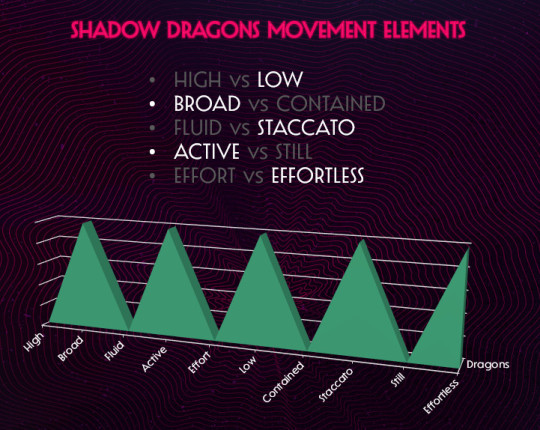
"With that video, we could more easily cast dancers trained in those styles of dance, martial arts and athletics. And show them a quick reference of the types of motion that we were looking for. This lead to shoots that are a highlight of my career. A day of pure creativity and play. 5/8 I quickly broke up some of what we captured into smaller actions, roughly retimed for game feel and put them into a motion matching database. That last bit was key, as it quickly allowed for 'controlled random' selection defined by the location of the feet, hips and hands. 6/8 Even in its most rough form, it was clear that could be something special. And proving it early in development meant we got to take a lot of big, fun swings when it came to character movement and performances. While not exactly as I envisioned, you can still see hints in the shipped game. 7/8 If you enjoyed this thread, I know you would also enjoy my book, Directing Game Animation. I discuss ballerina assassins, orchestral necromancers, shaolin archers and more. And how you can find what animation can do to make your game stand out. [link] 8/8"
[source thread]
#dragon age: the veilguard#dragon age: dreadwolf#dragon age 4#the dread wolf rises#da4#dragon age#bioware#video games#long post#longpost
121 notes
·
View notes
Text
Etiquette of the Edwardian Era and La Belle Époque: Tea

This is a new set of posts focusing on the period of time stretching from the late 19th century to the early 20th Century right up to the start of WWI. I'll be going through different aspects of life. This series can be linked to my Great House series as well as my Season post and Debutant post.
Today will be focusing on the rules of tea with this time period.
Tea was a staple in society, not only as a comforting beverage but as a social gathering beset by strict rules. Etiquette at tea is not only important for guests but is a sign of respect to one's host.
High Tea vs Afternoon Tea

You're reading both terms and you're thinking high tea is the formal version and afternoon is informal. In fact, no. It is the opposite. High tea was actually served far later, about 6pm/7pm and focused on more savoury, substantial dishes. High tea was more of a lower class tradition, designed to fill the stomachs of hungry workers. The word "high" is derived from the tall tables used. Afternoon tea is served at 4pm, designed to fill the gap between lunch and dinner. Afternoon tea is served at low tables with all the guests seated and involve a lighter meal, more nibbles than anything.
Hosting and Attending Tea

Tea is an event that happens every day, it's not an excuse for a snack, it's a ritual. One can have tea served in one's own home or at the home of a friend. One must be invited to tea, one can't just show up and expect to get fed. Tea was typically served in libraries or drawing rooms and done times outside in the gardens if weather permits. One had to dress for tea usually in comfortable but appropriate clothing. Men would wear suits, women would wear tea gowns or a simple gown - keeping their hats upon their head, if they are visiting. Tea was not poured by the footman but by the host or if it is a large party, by one assigned guest. The hostess or designated tea pourer would serve themselves last.
The Tea Set
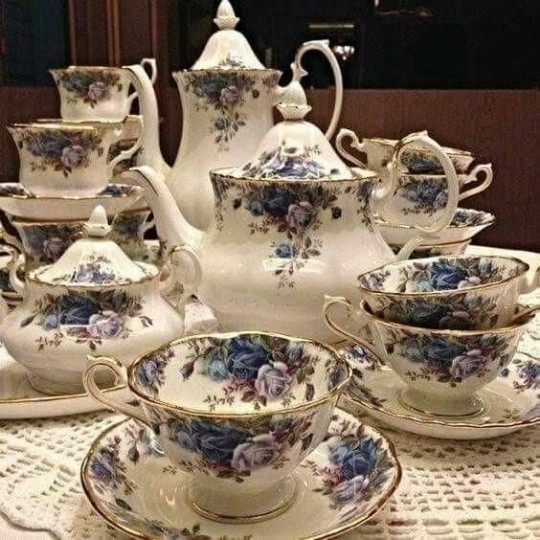
Tea sets are highly coveted and much remarked upon at tea. One would usually inherit a service (that's what the collection was called) or be gifted it at one's wedding. Services would all match and most households had different kinds, the best usually reserved for important guests.
Teapot: the tea pot held the hot water and tea leaves was was usually made of china and decorated.
Cups: the cups were generally low, shallow.
Saucer: a small plate for the cup to rest on
Tea cannister: where dried tea leaves would rest until needed.
Sugar bowl: was a small container made of china with a cover to protect the sugar from moisture.
Milk jug: a container for the milk
Slop basin: was a porcelain dish used for disposing tea leaves left behind with the dregs of tea.
Tea spoon: small spoon used to stir tea
Side Plate: small serving plate used for food.
As you might have noticed, other than a tea spoon, cutlery is not listed. There would be a spoon for jam and a knife for a scone, most food was designed to be eaten with one's hands.
There is also one instrument not listed here and it's the most recognisable thing at afternoon tea.
The Tiered Tray
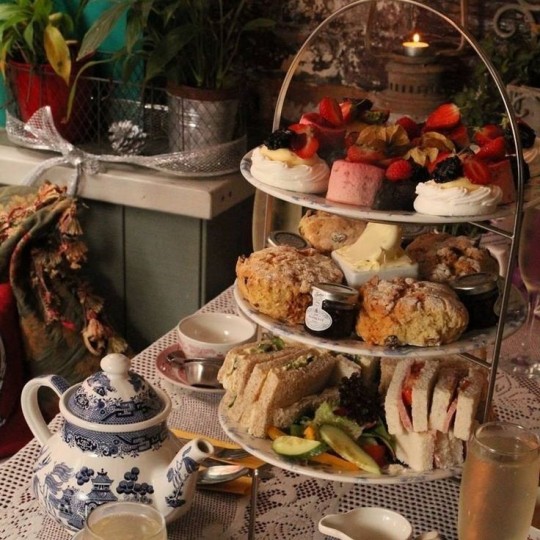
The tiered tray is a set of trays stacked upon one another holding on each one, a different course. Sandwiches and savouries were served on the bottom (Favourites include smoked salmon, cucumber, cress, egg salad sandwiches), scones on the second and sweeter delights served on the top (sponge cake, macaroons, pastries etc). One would begin ay the bottom and work one's way upward.
Making the Perfect Cup of Tea in the Edwardian Era/Belle Epoque/Gilded Age
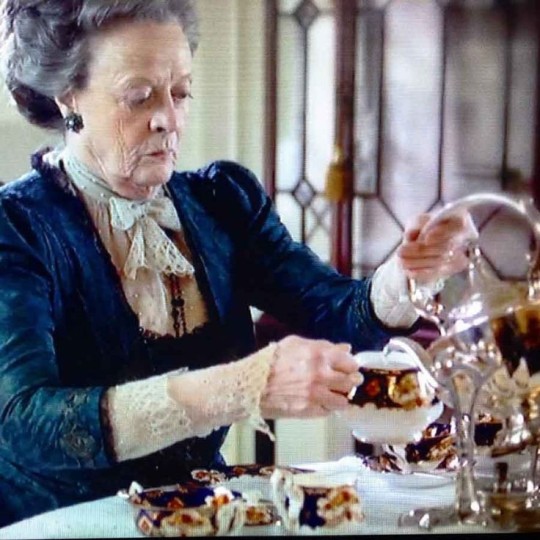
Disclaimers: Let's make one thing clear. Tea is not prepared one way for all. Tea is culturally important across the world and every culture has their own rules about how tea is consumed and served. There's no one right way.
I will be discussing the English way of brewing tea in this post.
As mentioned before, tea is held in a cannister before use. Tea leaves were added to the hot water and lightly stirred.
Controversially for most people, milk was commonly added first.
One would then set a strainer in one's cup, tilting the pot. The strainer will catch the leaves and leave your cup almost tea-pulp free.
With the tea added, one could add in sugar. The trick is not to make a show about it or be too loud. One simply should gently turn your spoon from the 6 o'clock position to the 12 o'clock position. Also, the spoon rests on the saucer when not in use and doesn't stay in your cup.
When drinking your tea, put your pinky down. That's an American myth. Simply lift your cup to you, lifting the cup to your mouth by the handle. Saucers are not lifted unless your cup is far away. Don't slurp it, there's plenty more where that came from.
Etiquette at Tea

Afternoon tea is for light conversation, do avoid heavy topics.
Listen attentively when being spoken to.
Don't talk with your mouth full or stuff your mouth. Typically everything should be polished off with 2-3 bites.
Gloves should be removed at tea because one is eating with their fingers.
If one is leaving the table to go to the bathroom or a breath of air, simply turn to your neighbours and excuse yourself. No explanation needed.
Napkins should be removed from the table and set across one's lap when one is sitting down. When finished with tea, set it beside your plate before you rise.
Also you daub, not smear.
Don't cut your scone but break it.
Don't lick your fingers.
Don't bang the spoon on the side of the cup.
Also there's no dunking biscuits into your tea. It's just not done at afternoon tea.
Never thank the staff for fetching anything - or at very least, don't be overhead doing so.
Always say your goodbyes to the hostess and compliment the tea, even if you had a rubbish time.
Also most importantly, never criticise somebody else's manners. That's the height of rudeness.
#Etiquette of the Edwardian Era and La Belle Epoque#Tea#Afternoon tea#High tea#Tea party#Edwardian Era#Gilded age#Belle Epoque#writing resources#writing reference#writing advice#ask answered questions#writing advice writing resources#writers#writeblr#writing#writing research#Writing resources writing reference#Writing reference writing advice#Writing advice writing reference#Fantasy guide
851 notes
·
View notes
Text
"high context vs low context" "culture clash" "never learned how to express himself" "neurodivergent vs neurotypical"
I feel like you guys live in some alternate reality where it's extremely common to tell the guy you're stuck with for the foreseeable future that you dislike them and wish they wouldn't talk to you
#Dungeon meshi#I don't understand what definition any of you are using for 'wrong' when discussing these two. It's a personality clash it happens#Rin: hey. Don't lump easterners into one category.#Y'all: oh boy! pre-made compartments to fit people into!
216 notes
·
View notes
Note
I do think it's a good thing to point out: violence is always the answer to violence when it's the system that creates the violence.
Megatron in every continuity was right that it needed to be a violent overthrow because the upper castes would not listen and would not change.
The title of Prime is a god-king status above the caste system entirely, but it does beseech its own violence just by existing.
Even if Optimus is a good person, that doesn't erase the damage and cruelty Primes are apparently known for. He is patient and he is imperfect and the tragedy of it is, does he even know that he's changed? How much of the difference is he aware of from his time before the Maxtrix to what he's become as a direct result of it?
Skyquake said he'd never side with a Prime. Not that he'd never side with Optimus, or the Autobots, but A Prime. The idea. The symbol. The Decepticons are fighting to be free from the shackles of a lineage of god-kings endlessly creative in their cruelty who, by some irony, they are compelled to follow by the nature of the relic.
Ratchet is a very good example of the hypocrisy. He was medical- upper middle to upper caste- and in TFP, we know Iacon hoarded a lot of resources. We see his prejudice plain as day just from how he describes Orion Pax and Megatronous. Hell, I'd say he flat out hated Megatronous for teaching a young Orion to speak his mind. He doesn't understand the righteous anger that the gladiator carried, and I don't think he cared.
Tl;Dr: there's a reason the Decepticons are more appealing, honey, most people just don't want to think about it too hard
Uh, I don't know if you're new here, anon, but yeah? Keep on cooking!
I don't know if this is a response to the reblog from nukeli about shattered glass, but under my 'analysis' and 'tf headcanons' and 'gladiator soundwave' and 'cybertronian culture' tags, I do talk about the roles of violence and how it's cemented within Decepticon culture as well as the 'appropriate behaviors' of low-caste vs high-caste of the Golden Age, especially between Orion Pax and Megatron and how it essentially fucked them up after the disaster meeting. Plus, I have posts about the potential cultural damage caused by the Quintesson occupation on Cybertron since they were the ones to implement the caste system.
Ratchet is such a great example of the show's use of unreliable narrator and how he encompasses a higher-caste sensibilities, especially when you take in his background. Compared to Orion Pax, who literally bypassed all the regulations and went from uneducated bumpkin from the middle of nowhere to a cushy and prestigious position underneath Alpha Trion, Ratchet had the correct frame and went through the right channels, so he never had to deal with the kind of discrimination others would speak about. I think of him like that prideful, racist grandpa who the "but you're not like them" locked and loaded. There's a lot of those instances across the show, but I really enjoy it since it fleshes out the story and the character. Ratchet isn't subtle. Not at all. And no one calls him out on it, so it's super telling on what kind of society Golden Age Cybertron was.
Personally, I thought it was really interesting when Skyquake had said that, especially with how Aligned/TFP done the Thirteen since Megatron literally took his name from Megatronus Prime, the direct opponent of Prima, and had tried to legitimize the movement with the Primacy. That's how I read Megatron's demand since it was proof of real change, but there was no way the High Council was going to allow that. Instead, they decided to take advantage of Orion Pax as a way to break the Decepticon movement and send a message to everyone else. Orion wasn't meant to be a Prime. He was just a figurehead, a token of empty promises, until it went off the rails, and he actually unearthed the damn Matrix.
Going back to Skyquake, I guessed that the TFP!Decepticons do have devotees to outlawed sects along with atheists as Megatron has no issues with getting Primal Artifacts, even if he needs to commit corpse desecration to a Prime of the fucking Thirteen to use the Artifact. (Which is another wild event under that mech's belt. It's a good thing they don't have balls because nothing could carry his.) So Optimus was basically barking at the wrong tree. But a majority of the Decepticons would be like that since Optimus represents Prima's reflection of a Prime and civilization. That distinction is really important because after the death and exile of over half of the Thirteen Primes, very few were actually left to guide the fledgling societies. Each Prime represented different Aspects and Domains, so with none able to challenge Prima... is it really a huge surprise it went wayside?
Prima was the Firstborn and Eldest. He was literally the God-King as the Prime of Light. Megatronus Prime was the only one who could truly challenge him, but he laid down his weapons and chose self-exile, and with death of Solus and Liege Maximo, Onyx, Micronus, and Thirteen joining the Allspark to kickstart it, Nexus separating himself, and Quintus, Amalgamous, and Vector leaving... Alpha Trion and Alchemist weren't enough to stand against Prima, who had a vision on how Cybertron should be.
My point is that the Decepticons stood against Prima's Champion by fiercely declaring their own leader. Megatron would have been an uncrowned Prime, a call to return to the long past before city-states, or a symbol a future without them.
#ask#transformers#transformers prime#tfp#ratchet#megatron#skyquake#optimus prime#optimus#gods and goddesses#tf headcanons#maccadam#analysis#my thoughts#my writing#i will retag this later when im more coherent
90 notes
·
View notes
Text
letterboxd is a great case study in how 'democratising' culture criticism at the end production point does nothing to actually problematise received notions of 'high' vs 'low' art, etc. like my god the things people will tear to shreds when every major studio release from the past 5 years has like a 3 star average minimum 💀
84 notes
·
View notes
Note
Your post about art vs content got me thinking about the differences between the two. To me there is no difference besides the mindsets. One is of creator and the enjoyer, the other is content and consumer it removes the personhood, the joy/emotion, from the equation. Like a writer or video creator may not see their work as art so content creator maybe a way to refer to themselves comfortably but it sounds so machine, emotionless and lifeless, like a cookie cutter recipe mass producing something verses people lovingly crafting something...then again Disney uses a cookie cutter recipe for the most part and it brings out bangers cause people lovingly make it their own so maybe I'm thinking too hard on this
Does my long-winded rant make sense?
see, I get what you mean, but I still feel like the willingness to entertain calling art of any kind "content" reduces it to the facet of consumption where in reality, the experience of consuming art is not the sole defining trait of it.
Reducing arts like music, writing, painting, dance, voice acting, theater, etc. to the role of "content"- a thing created to be consumed, measured and valued by how pleasant or easy it is to digest- I feel that it was our biggest red flag to herald the incoming tide of AI "art".
Because if art is "content", if arts are nothing but consumable matter, then obviously the key to success is to produce as much soft, tasty, edible paste as we possibly can at the lowest possible expense.
It's the same issue I have with "meal replacements", diet culture, nutrient slurries, twenty-step skincare routines, 24/7 body padding and shapewear and laxative teas and "grind culture". It's not a cause, but a symptom, of the disease that is late-stage capitalism.
Things must be produced at low cost and remain in high demand forever. Things must be perfect and palatable and the new hit trend forever. People must pay hand over fist to consume without asking anything in return, and if they start dropping like flies at the unending unrewarded thankless demand of it all, then that must be treated as a weakness. We should all take pride in how much we can spend, pay, give, produce, and think as little as possible about what we ask for ourselves.
So, who cares if, of two identical paintings, one was made by a person and one was made by a computer program? It's the same work, so what does it matter? What does it matter?
I am an artist. I make art. I ask a question, make a statement, declare something horrific or challenging or upsetting or wrong or grotesque, and when you respond, we are together experiencing a conversation. We are existing, two people living one life and reaching out and touching across time and space. No matter the work, you're at the barest minimum saying, "I'm alive, and you're alive, and at one time or another we shared this same world, and at the end of the day we aren't too terribly different. My heart is worth sharing, and your heart is worth the struggle of understanding."
An AI-generated piece, a computer-generated voice, a CGI puppet of someone long since dead and gone, they cannot speak. They have no voice. Ay best, they are the most chewable, consumable, landlord-beige common denominator possible that you can sit and listen to like the lone survivor of a shipwreck listening to the same three songs on a broken record, and at worst, they're the uncaring vomit of an empty, unloving, value-addled hack wearing the skin of someone I know over their own.
When you abandon art to say that you make content, that should not be a point of pride. That's an embarrassment. That's not sitting down for an intelligent discussion with an equal, that's kneeling at the feet of the crowd and saying, "what do you want to see me do? I can be anyone you've ever loved. I can be them, I can be anyone, as long as you love me."
I can make content. I can be consumed. What do you want to consume? I'll make myself consumable. I'll make myself just like anything you like. And I'll make so much of it that you'll never have to go anywhere else, because it'll all be right here, and under all the cut-and-paste schlock you've seen before I will sit alone in the dark and the silence and I will know that I am safe, because I am valued, because I am desired, and I need to be desired or else I am worthless like a factory that no longer churns out steel or a hen that no longer lays eggs or a cow that is too old to make milk.
Content, the most literal meaning, is something which is contained inside a container. What it is doesn't really matter, and the best it can hope to be is something worthy of being scooped out and used.
Art is an experience that transcends value. Art is something you can eat without paying for. You can make it out of anything and anyone can do it. It can be crude and vulgar and bad, and that's a strength because it means something. It always, always means something, and it doesn't matter if you like it or not. It's not content because it doesn't fill anything. It's a living, breathing thing, and whether you want to birth it or eat it, then you're going to have to be willing to put the fucking work in
#I want to apologize but I'm not going to#This is important to me#I do not want to create content#I do not want to be universally loved#I do not want my existence to revolve around being used#I'm not a machine I'm a person and I'll do what makes me happy#Even if that isn't good or useful#I don't want to be pretty I want to be alive#Don't look at me#I'm breathing#I'm screaming#I'm ugly and sharp and painful to hold#And that is not a bad thing#To come back to
348 notes
·
View notes
Text
wounded feminine energy vs wounded masculine energy:
Wounded feminine will struggle primarily with feelings of unworthiness that will present itself in a lot of different ways but wounded feminine energy may include things like:
issues with control and manipulation : stepping outside of her feminine energy and her home energy of recieving and trying to push and pull things into fruition or to go in the direction she sees fit and often for personal gain. This may present in her relationships with others, manipulating her friends, manipulating her partners, manipulating strangers. May be dishonest, deceitful, or deceptive.
low self worth & self esteem: she’s unable to make good decisions on who she chooses to be around and what she allows, may fall into a habit of people pleasing, may struggle with internalized misogyny, may be boy crazy or blow her entire life up for male validation or male presence, may constantly speak negatively upon herself and upon others. May victimize herself often or be prone to feeling “sorry” for herself, may also be heavily emotionally unstable or consumed by her emotions to the point where she’s constantly at high points of emotional distress. She has no boundaries, she’s desperate for love, she’s obsessive in a way where it comes from a place of lack or a void.
Vindictive,bitter, and jealous: falls right in hand with low self worth and self esteem, projecting all her fears and jealousy onto others especially other women. Always out to get someone, always picking on someone, always attempting to humiliate or tear someone apart.
over-giving: falls right into people pleasing but a feminine who may be over giving may not know how to or be unable to protect her energy, her power, her divinity and her “soft feminine”, she may become over-giving, over nurturing, overly empathetic to the point where she pours too much of herself (from a raw and authentic pool of her energy) into others. this comes hand in hand with my post about a feminine needing a divine counterpart who is conducive to her energy and is safe and giving so that when she’s in her most vulnerable state her energy won’t go to waste.
Shame and guilt: ashamed of her body, ashamed of her sensuality, ashamed of her femininity, ashamed of what it takes to protect herself from others, guilty for putting herself first, guilty for being in her power, guilty for recieving what she rightfully deserves, etc. etc. falls hand in hand with what I spoke about briefly about how purity culture and certain aspects of culture and life may supress one’s feminine nature and identity and ability to connect with self.
Consumed by emotions: she’s angry, she’s aggressive, she’s emotionally consumed or disturbed, she’s violent, always fighting people, doesn’t have effective problem solving or communication skills outside of violence or conflict. Is always involved in conflict, is always involved in drama, befriends people with the intention of constantly being in the center of an issue or being aware of an issue, nosy and cunning. If she’s jealous and bitter she expresses it heavily.
***
Wounded masculine will struggle primarily with how he sees himself, honoring his heart space, and what it means to be masculine or a man. This is not a new issue, it’s as old as time, wounded masculine may exude behaviors like:
overly competitive and combative: masculine may have a tendency to try to out compete others, regardless of sex or gender. He competes with women, he competes with men. He used envy and insecurity to fuel these urges to compete with others. He wants to be the biggest all the time, he wants to be the most successful, the most important, the most looked at, etc. etc. there’s nothing wrong with these desires when they come from a place of self love and growth, there is an issue when they come from the ego and his desire is to push others out of their rightful place or consume the energy of others to make himself larger. Or he needs to be right and he’s argumentative. He may be prone to having narcissistic traits or a narcissistic personality type, he may have an inflated ego or sense of importance. Constant inner and outer conflict, he’s displeased with himself, he’s displeased with what there’s, he’s always fighting, always arguing, always involved in some sort of altercation.
Abusive and angry: he has a tendency to communicate with physical violence or is unable to solve problems effectively. He has a desire to hurt others to make himself feel stronger or more powerful or feel validated and respected. Constant inner and outer conflict, he’s displeased with himself, he’s displeased with what there’s, he’s always fighting, always arguing, always involved in some sort of altercation.
controlling and/or possessive: controlling in plenty of areas, in his relationships, in career, in life. Reflects a masculine whose not confident in his ability to be loved and admired, not confident in his ability to make a difference or take action that will push things forward or into fruition in a genuine and meaningful manner. A possessive masculine is a masculine who has a strong desire to consume things rather than enjoy them and allow them to flourish. Especially in his relationships, he may attempt to “squash” his partner, keep them from stepping into their power, keep them from doing well, he may have a tendency to view his partners and counterparts as objects to be had or to be owned rather than to be appreciated or as an energy that is complimentary and adds to his value or divinity. This goes hand and hand with what I spoke about briefly about men in relationships with successful women who try to trap them with pregnancy at the height of their careers or try to minimize their success. He’s overly critical of others and overly critical of himself on an internal level. May be prone to picking up misogynistic tendencies and views, he picks on women, he degrades them, he feels the need to tell them what to do and what’s acceptable.
Manipulative: again. A masculine who doesn’t think he’s truly capable of making an impact, a masculine who doesn’t believe he’s capable of truly being loved or doesn’t believe he has enough value to be stayed with in his relationships. A masculine who may have a tendency to see others as below him or as pawns.
over-preforming or overcompensating: am i man enough? Am I doing enough? Will they look at me or admire me enough? He tries too hard to be “masculine”, is afraid to stray away from masculine stereotypes, bullies and takes out aggression towards men who don’t fit the mold that he’s been conditioned to believe is what masculinity or being a real man looks like. Leads him to being controlling, resentful, aggressive and violent in a lot of cases. Resents others who live in their truth and live authentically despite judgment and rejection, tries to squash or push down others who go against what he’s been conditioned to believe is right or wrong, ends up pushing people away or ruining a lot of his relationships and his connections because he’s unable to find the courage to be who he is from an authentic stand point and he’s angry because he always feels like he has to preform and conform. And bro is definitely the lgbtq police and the “that’s gay asf” guy in the back who nobody asked an opinion from. He’s overly critical of others and overly critical of himself on an internal level. May be prone to picking up misogynistic tendencies and views, he picks on women, he degrades them, he feels the need to tell them what to do and what’s acceptable.
Unable to feel emotions/disconnected from self: unable to communicate and communicate effectively, he doesn’t understand himself and therefore can’t understand others, has a tendency to resort to anger or shutting down or running from things when he’s feeling triggered or being coaxed out of his shelf or is required to open up and be vulnerable. He’s guarded and closed off, he’s defensive, he struggles with an avoidant attatchment style, he’s afraid of being seen, he’s afraid of true intimacy, he’s afraid of being perceived in general and perceived as being soft or emotional. He doesn’t want to talk about his feelings because he’s conditioned not to and it’s difficult. He’s stagnant, he’s unable to grow, he’s unable to learn hard emotional lessons. Repressed his feminine energy or actively represses it and this goes hand and hand with overcompensating and over preforming.
Unstable: unstable, unsupportive, unsafe physically and emotionally. He can’t create a safe space for you, for others, or himself emotionally or physically and he will not.
#self love#self care#self improvement#self discovery#dream girl#self expression#healingjourney#self healing#manifestation#divine feminine#divine masculine#wounded feminine energy#wounded masculine energy#energy healing#self worth#self control#self concept#self growth#self awareness#self image#shadow self
213 notes
·
View notes
Text
Best Underrated Anime Group D Round 4: God Troubles Me (Hanhua Riji) vs Happy Sugar Life

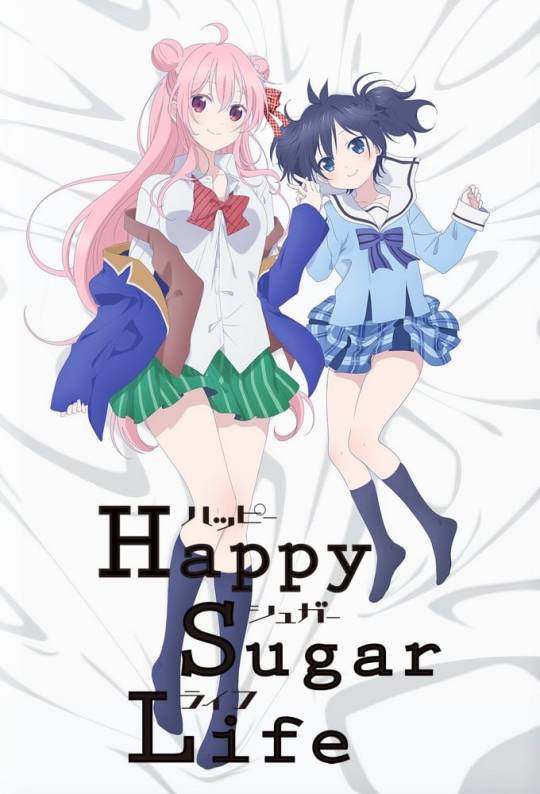
#D2: God Troubles Me (Hanhua Riji)
Prophecy girlie, hyper cellphone, and gamer cat get silly
#D3: Happy Sugar Life
Lots of traumatized minors messing each other up bad
Details and poll under the cut!

#D2: God Troubles Me (Hanhua Riji)
youtube
Summary:
Su Moting, the daughter of a god and a monster, is the supposed Chosen One set to fix the balance of the universe, but unfortunately, she’s just barely living as it is. Only just told of her great fate, Su Moting couldn’t care less as she juggles her social life, work, and her new duties (which she doesn’t take seriously). Alongside Moting are Star Tianji and Star Dikui, a god and a monster out to help our protagonist with her grand mission. They, too, are also struggling to figure out life on Earth, as Tianji is an immortal who doubles as the god of Su Moting’s personal cellphone and Dikui is a cat monster immortal more concerned with lazing about. Somehow, they make things work as the best worst roommates of all time.
Propaganda:
Four-season donghua (Chinese anime) that’s so recent and seeped in American pop-culture that I needed to do a double take when a literal cockroach said “Run, Forrest, run,” in English with a heavy Chinese accent. There’s a cat who plays video games (he’s very good at it), a phone who’s the worst kind of hype man, a sentient air conditioner, a guy who can shapeshift into any vehicle, off-brand Super-Man but jerky, a high-ranking god that collects anime figures, and the mega ultra cool protagonist who is a normal human girl fresh out of college and always low on money. It’s great
Trigger Warnings: Animal Cruelty or Death, Child Abuse, Emotional Abuse, Flashing Lights, Racism, Self-Harm, Suicide.
All the TW’s above are done for comedic effect, but they come in fast and hard with the humor. Better safe than sorry! The biggest things I remember are one or two “blink and you’ll miss it” racist jokes, characters joking about killing themselves out of embarrassment (no one goes through with it), and there’s a LOT of self-harm via stupid decisions. Stupid things like tying a loose tooth to the back end of a sports car sort of stupid. The protagonists have 3 brain cells collectively.

#D3: Happy Sugar Life
youtube
Summary:
Satou Matsuzaka is a beautiful high schooler who has a reputation for being permissive with men. However, a chance encounter with a young girl named Shio Koube makes Satou realize that this is her first and only true feeling of love.
Telling others that she lives with her aunt, Satou secretly shares an apartment with Shio. Despite her innocent appearance, Satou is willing to do anything to protect her beloved, resorting to desperate measures to ensure that their “happy sugar life” remains intact.
Propaganda:
It is questionable, but in the way that the anime is meant to make you uncomfortable. It’s an uneasy psychological horror. You’re meant to dislike almost the entire cast, so you don’t know who to root for. Yes, the characters are fucked up, but it isn’t glorified as far as I can see.
It made my stomach churn, and I was sobbing at the end because that’s what it was trying to do.
I said it’s not good, meaning it’s not comfortable, and none of the characters are good. But it’s well-written and it’s interesting.
Trigger Warnings:
Child Abuse, Pedophilia (not graphic)
Murder/Violence (one brief scene is semi-violent, but most isn’t shown)
Kidnapping
Rape/Non-Con (not shown, but it’s obvious that it happened/explicitly stated)
Suicide

When reblogging and adding your own propaganda, please tag me @best-underrated-anime so that I’ll be sure to see it.
If you want to criticize one of the shows above to give the one you’re rooting for an advantage, then do so constructively. I do not tolerate groundless hate or slander on this blog. If I catch you doing such a thing in the notes, be it in the tags or reblogs, I will block you.

Know one of the shows above and not satisfied with how it’s presented in this tournament? Just fill up this form with your revisions, and I’ll consider adapting those changes.
New: Starting round 5, screenshots will be included in the poll post. You can submit screenshots through the form linked above, or through here, via ask or dm.
Guidelines in submitting screenshots:
No NSFW or spoilery images.
Pick some good images please. Don’t send any blurry or pixelated ones.
You may send up to 9 screenshots, but not all may be used.
#anime#donghua#best underrated anime#polls#poll tournament#tournament#anime tournament#animation#group stage#group stage round 4#tournament polls#god troubles me#hanhua riji#汉化日记#happy sugar life#group d
31 notes
·
View notes
Text



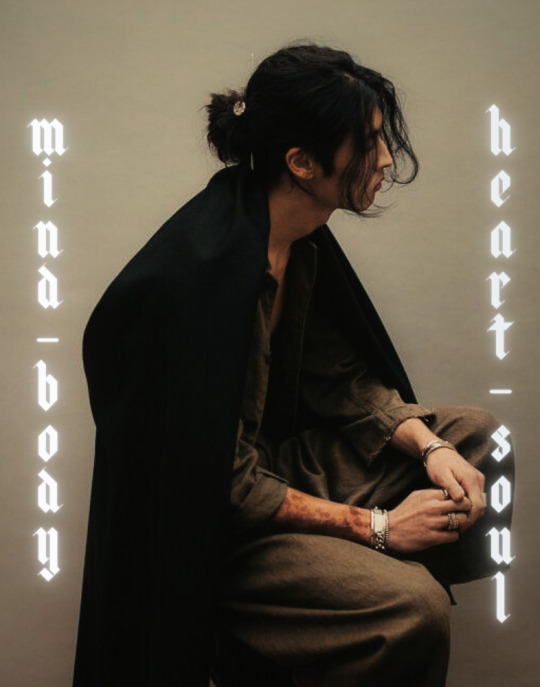


𝐈𝐍𝐅𝐈𝐍𝐈𝐓𝐄 𝐓𝐀𝐍𝐆𝐄𝐍𝐓𝐒
"𝑻𝒆𝒍𝒍 𝒕𝒉𝒆 𝒌𝒊𝒏𝒈; 𝒕𝒉𝒆 𝒇𝒂𝒊𝒓 𝒘𝒓𝒐𝒖𝒈𝒉𝒕 𝒉𝒐𝒖𝒔𝒆 𝒉𝒂𝒔 𝒇𝒂𝒍𝒍𝒆𝒏. 𝑵𝒐 𝒔𝒉𝒆𝒍𝒕𝒆𝒓 𝒉𝒂𝒔 𝑨𝒑𝒐𝒍𝒍𝒐, 𝒏𝒐𝒓 𝒔𝒂𝒄𝒓𝒆𝒅 𝒍𝒂𝒖𝒓𝒆𝒍 𝒍𝒆𝒂𝒗𝒆𝒔. 𝑻𝒉𝒆 𝒇𝒐𝒖𝒏𝒕𝒂𝒊𝒏𝒔 𝒂𝒓𝒆 𝒏𝒐𝒘 𝒔𝒊𝒍𝒆𝒏𝒕; 𝒕𝒉𝒆 𝒗𝒐𝒊𝒄𝒆 𝒊𝒔 𝒔𝒕𝒊𝒍𝒍𝒆𝒅. 𝑰𝒕 𝒊𝒔 𝒇𝒊𝒏𝒊𝒔𝒉𝒆𝒅."
— 𝐓𝐡𝐞 𝐥𝐚𝐬𝐭 𝐎𝐫𝐚𝐜𝐥𝐞 𝐨𝐟 𝐃𝐞𝐥𝐩𝐡𝐢
𝐀𝐁𝐎𝐔𝐓
GENRE: New Adult (16-25) / Contemporary Fantasy SUB-GENRE: Romance / SciFi / Dystopian / Action POV: Third Person (Multi) / Past Tense THEMES/TROPES: War, Found Family, Heroism, Sacrifice, Power, Corruption, Enemies to Lovers, Bigotry, Forgotten Past, Faith, Dark VS. Light STATUS: Seeking Publication
𝐒𝐘𝐍𝐎𝐏𝐒𝐈𝐒:
In the wake of a god being mysteriously killed, the Nameless War has waged between the gods and humanity for fifty-eight years, killing that which is mortal and immortal, and creating constant battles for territory between the divine Creator military and the human Revolutionists. As hope for future peace between the species wanes, the fate of the war lands in unlikely hands. Pandora, a goddess, the lost creator, nameless and chained to the Earth because of duty, yet still running from her true power. Quinn, a god, the skijic and Creator High General, desperate for the memories of a life lost and the familiarity of a purple-eyed goddess. Natia, a girl, heiress to one of the Republic of Valentulus’s most powerful cities, and slave to the Revolutionist Snake General. Loyalties whither, fear awakens, and stories collide as the Nameless War reaches its tipping point. It is up to Pandora, Quinn, and Natia, each of them sworn against one another, to challenge the boundaries of their duties—and their pasts. The only thing that might change their opposing fates is the truth, but letting the past fly free could very well set the darkness loose. The fight between deities and humanity is made equal, and the fate of the universe unsure.
𝐂𝐇𝐀𝐑𝐀𝐂𝐓𝐄𝐑𝐒 - 𝐩𝐫𝐨𝐭𝐚𝐠𝐬
PANDORA: Goddess of Nothing, Governor of Domum Deorum, Creator of the Universe. Extremely skilled in both alchemic and physical combat; well versed in a number of chordophone instruments (piano, kaleiscian zarisk, violin); selfless and self sacrificing; compassionate, analytical, cultured, stubborn, witty. QUINN: God of Stars, High General of the Creator Military. Omne’s personal “lap dog” before his capture; good with any blade, has "shit aim"; short with those he doesn’t know/care about; protective, sarcastic, composed, knowledgeable, caring, prideful. NATIA GENESIS: Heiress of Genesis Point. Little Sparrow. Remarkably intelligent in regards to literature, strategy, and divine biology due to intense schooling; the Republic of Valentulus' most renowned deitologist; near non-existent family ties outside of the media; intelligent, kind, self-destructive, abrasive.
𝐂𝐇𝐀𝐑𝐀𝐂𝐓𝐄𝐑𝐒 - 𝐚𝐧𝐭𝐚𝐠𝐬
OPHELIA SERPENTINE – General of the Revolutionist Military Government. Although not a master of strategy like Natia, she is manipulative; willing to do any and everything to maintain her power; manipulative, emotionally intelligent, controlling, dedicated, knowledgeable, passionate. OMNE - Goddess of the Universe (Mind), Queen of the Gods. Like Ophelia, she is extremely manipulative in order to achieve her means, though she keeps them hard to distinguish; analytical, facetious, secretive, manipulative, humorous, rude.
𝐒𝐄𝐓𝐓𝐈𝐍𝐆
REPUBLIC OF VALENTULUS – Otherwise known as the R.O.V.; had once been the newly created nation in place of the United States in order to maintain control over the worsening relations between gods and humans. Unfortunately, much of it was destroyed after the beginning of the war, spare for the wealthiest districts and cities. DOMUM DEORUM - Heather’s city she built through the means of alchemy. Gods and humans live in unity here, under the leadership of Heather’s councils: Low Council (general citizens), High Council (divine and human district leaders), Master Alchemists (gods who have mastered the alchemic arts). For fifty-eight years Domum Deorum has existed in secret, though their efforts in the war remain influential. GENESIS POINT - A city with close ties to the Revolutionist military government. Mainly profits from scientific innovations, particularly thanks to Natia's efforts as a deitologist, and diplomatic advisors. As such, they are a major producer of both technology and weaponry. The city has been led by the Genesis family since its creation, Lukyn Genesis the most recent, with Natia Genesis as the next in line to inherit one of the R.O.V.'s most powerful governments.
(order of protags in the images above: Natia Genesis, Quinn, Pandora.)
Note: this is definitely one of several times i've introduced this particular book, but i'm so, so, so happy to do so. infinite tangents is the first book of many in the natural orders series, and i'm so excited to share with you all how far this story has come since i came up with it in 2014 (which is insane to me). hopefully, this story will be published soon... if i can work up the courage to email literary agents.
#writeblr#writers of tumblr#writer#wip intro#wip introduction#writing introduction#writerblr#books#aspiring author#tno#the natural orders#fantasy novel#fantasy series#tno- infinite tangents#plot#setting#worldbuilding#ocs#original writing#original characters#romance#scifi#action
59 notes
·
View notes